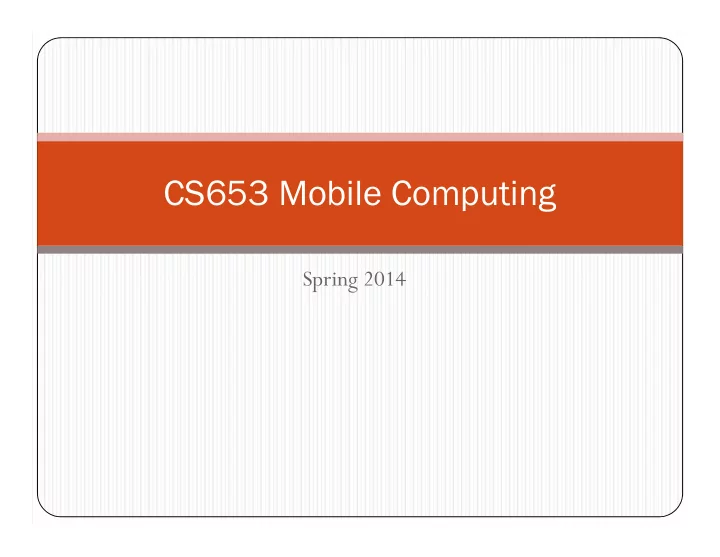

CS653 Mobile Computing Spring 2014 Spring 2014
Course Overview PG elective course, open to PG and UG students. PG elective course, open to PG and UG students. Prerequisites: a previous course in networking (CS348 or Prerequisites: a previous course in networking (CS348 or CS641 or equivalent) CS641 or equivalent) Topics in wireless communications and mobile systems Topics in wireless communications and mobile systems (wireless LANs, cellular systems, sensor networks etc.) (wireless LANs, cellular systems, sensor networks etc.)
Grading Course project – 30% Course project – 30% Will involve analyzing traces from wireless experiments, and Will involve analyzing traces from wireless experiments, and running wireless simulations using network simulators running wireless simulations using network simulators Will learn how to analyze and understand wireless systems Will learn how to analyze and understand wireless systems Requires basic scripting and coding skills Requires basic scripting and coding skills Teams of 3 students each Teams of 3 students each Monthly reviews with instructor to monitor progress Monthly reviews with instructor to monitor progress Final report, presentations, individual viva Final report, presentations, individual viva
Grading Course project – 30% Course project – 30% Short in-class quizzes – 20% Short in-class quizzes – 20% 2 quizzes during the semester in class 2 quizzes during the semester in class Dates will be announced in the previous lecture Dates will be announced in the previous lecture Mid-semester exam – 20% Mid-semester exam – 20% End-semester exam – 30% End-semester exam – 30%
Course Content (1) Overview of wireless and mobile systems (wireless LANs, Overview of wireless and mobile systems (wireless LANs, cellular systems, sensor networks, etc.) and the challenges cellular systems, sensor networks, etc.) and the challenges therein. therein. The radio channel and wireless physical layer design. The radio channel and wireless physical layer design. Medium access, multiplexing, link adaptation. Medium access, multiplexing, link adaptation. Multicast, opportunistic routing, flooding, and other techniques Multicast, opportunistic routing, flooding, and other techniques exploiting wireless broadcast and receiver diversity. exploiting wireless broadcast and receiver diversity. Multihop routing protocols, routing metrics. Multihop routing protocols, routing metrics. TCP behavior over wireless, other transport layer issues. TCP behavior over wireless, other transport layer issues.
Course Content (2) Solutions to handle mobility at various layers of the Solutions to handle mobility at various layers of the networking stack, handling disconnected operations in networking stack, handling disconnected operations in applications. applications. Energy efficiency in mobile systems. Energy efficiency in mobile systems. Mobile security. Mobile security. Localization and service discovery techniques. Localization and service discovery techniques. Smartphone-based mobile computation and applications. Smartphone-based mobile computation and applications. Future directions: dynamic spectrum access, heterogenuous Future directions: dynamic spectrum access, heterogenuous networks, internet of things. networks, internet of things.
Readings Slides from lectures will be available on the course web page. Reference text book: Mobile Communications (2nd ed.). Jochen Schiller. Research papers will also serve as references.
Recommend
More recommend